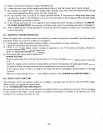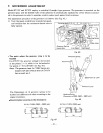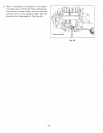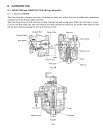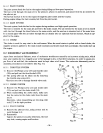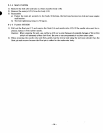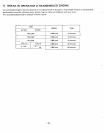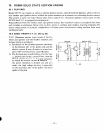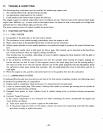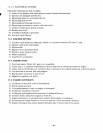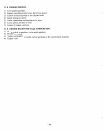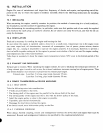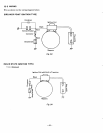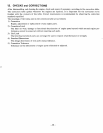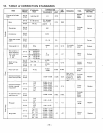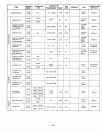
The following three conditions must be satisfied for satisfactory engine start.
1.
The cylinder filled with a proper fuel-air mixture.
2.
An appropriate compression in the cylinder.
3.
Good sparks at the correct time
to
ignite the mixture.
The engine cannot be started unless these three conditions are met. There are
also
other factors which make
engine start difficult, e.g., a heavy load on the engine when it is about
to
start at low speed, and a
high
back
pressure due to a long exhaust pipe, just to say a few.
The most common causes of engine troubles are given below.
11
-1
STARTING
DIFFICULTIES
1
1
-
1
-
1
FUEL
SYSTEM
1)
No
gasoline in the fuel tank;
or
the fuel cock is closed.
2)
The carburetor is not choked enough, particularly when the engine is cold.
3)
Water, dust or gum in the gasoline block flow
of
the fuel to the carburetor.
4)
Inferior grade gasoline
or
poor quality gasoline is not gasified enough to produce the correct fuel-air mix-
5)
The carburetor needle valve is held open by dirt or gum. This trouble can be detected as the fuel flows
out of the carburetor when the engone
is
idling. (Overflow)
This trouble may be remedied, depending on cases, by lightly tapping the float chamber with the grip of
a screwdriver or the like.
6)
If the carburetor overflows, excessive fuel runs into the cylinder when starting the engine, making the
fuel-air mixture too rich
to
burn. If this happens, remove the spark plug, and turn the starting pulley
a
few turns in order to Iet the rich fuel-air mixture out of the spark pulg hole into the atmosphere. Keep
/-
the carburetor choke open during this operation.
Dry
the spark plug well, screw it into place, and try to
st art again.
ture.
7)
When the engine is cold, pull the craburetor knob to let the gasoline flow into the carburetor.
11
-
1-2 COMPRESSION
SYSTEM
If starting difficultes and loss of power are not due to the fuel system or ignition system, the followings must
be checked for possible lack of Compression.
1)
Engine inside is completely dried up because of a long period of non-operation.
2)
Loose or broken spark plug. This causes a hissing noise made
by
mixture gas running out
of
cylinder
in
3)
Damaged head gasket or
loose
cylinder head.
A
similar hissing noise is produced during compression
4)
Incorrect Tappet Clearance
If the correct compression is not obtained even after remedying the above, disassemble the engine and
check further as follows:
a) Valve stuck open due to carbon or gum on the valve stem.
b) If the piston rings are stuck on the piston, remove the piston and connecting rod from the engine,
compression stroke during cranking.
stroke.
and clean, remedy or replace the parts.
-
38
-



